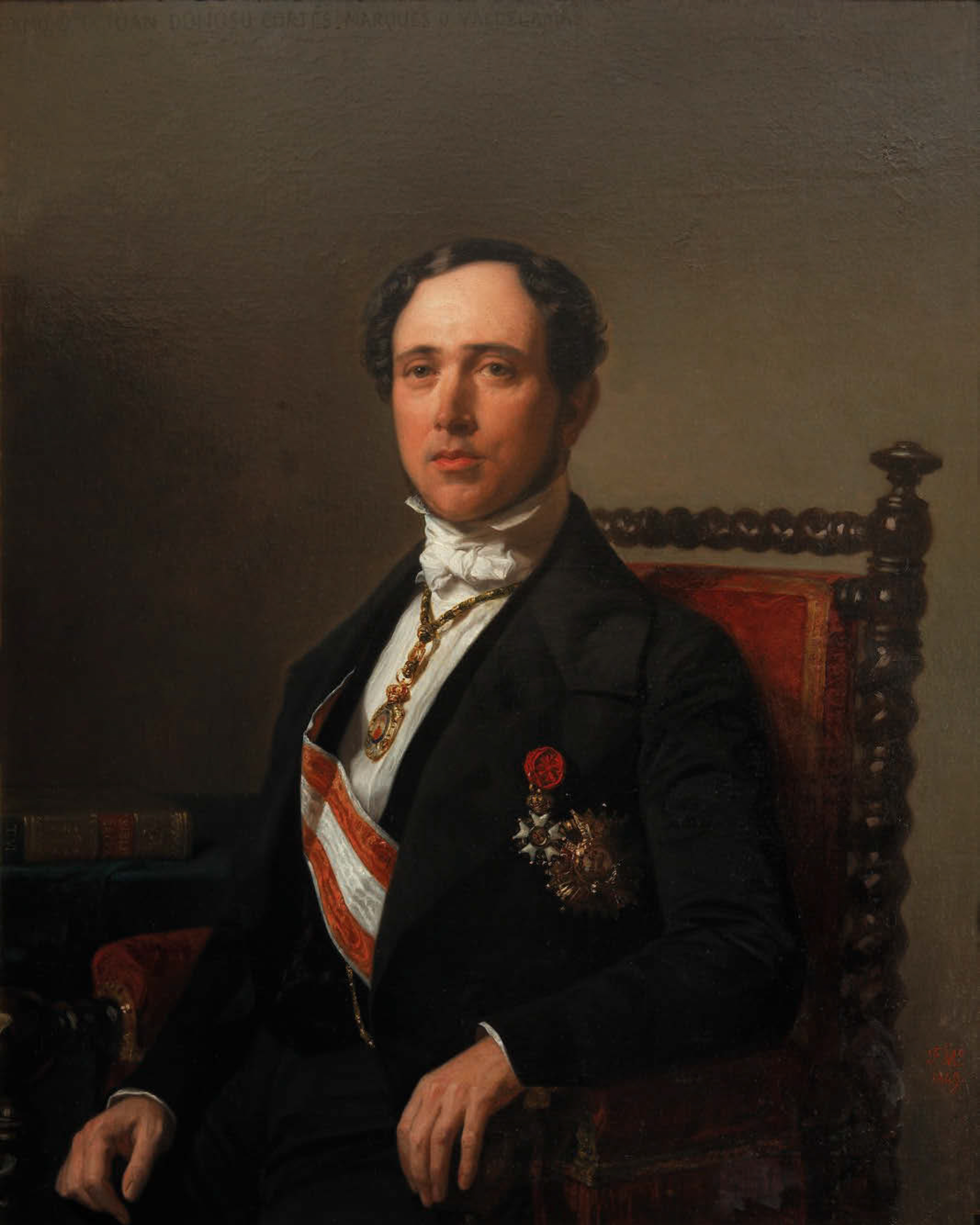
Juan Donoso Cortés
Juan Donoso Cortés, marqués de Valdegamas (6 May 1809 – 3 May 1853) was a Spanish counter-revolutionary author, diplomat, politician, and Catholic political theologian.[1]
Juan Donoso Cortés
Biography[edit]
Early life[edit]
Cortés was born at Valle de la Serena (Extremadura) on 6 May 1809. His father, D. Pedro Donoso Cortés was a lawyer and landowner, and a descendant of the conquistador Hernán Cortés. His mother, Maria Elena Fernandez née Canedo Cortés was a provincial heiress.[2] During his youth, Juan Donoso was tutored by the liberal Antonio Beltran in Latin, French, and other subjects required for entrance to a university. At 11, possibly due to issues at home, Juan Donoso left to study at the University of Salamanca. He only remained there a year before leaving to study at the Colegio de San Pedro de Caceres. In 1823, at age 14, he entered the University of Seville to study law, and would remain there until 1828. It was here that Donoso Cortés first encountered philosophy; he fell under the influence of liberal and traditionalist thinkers such as John Locke and Louis de Bonald.[1][3]
Donoso returned home to work at his father's law practice for a couple of years. At this time he continued his eclectic reading habits. In October 1829, Cortés was offered at professorship in aesthetics and politics at the Colegio de San Pedro de Caceres. He was carried away by Romanticism and stressed feeling over rationality. He criticized medieval feudalism but defended the Papacy and the Crusades, which he believed engendered vitality into European civilization.[1] Carried away by the rationalism prevalent in Spain following upon the French invasions, he ardently embraced the principles of Liberalism and fell under the influence of Jean-Jacques Rousseau, whom he later characterized as "the most eloquent of sophists".
Entry into politics and journalism[edit]
Cortés married Teresa née Carrasco in 1830, however their marriage lasted only five years with the death of Teresa after the birth of their only child, Maria. It was also at this time that Juan Donoso entered politics along with his brother-in-law.[1] He entered politics as an ardent liberal under the influence of Manuel José Quintana.[4] After the death of King Ferdinand VII, Donoso, along with most of Spain's liberals, backed the late king's fourth wife, Maria Christina, and her claim to the throne of Spain. They were opposed by Ferdinand's clerical and conservative brother Carlos, and his conservative supporters who were known as Carlists. In 1832, Donoso wrote a memorandum to King Ferdinand defending female succession as being in line with the king's Pragmatic Sanction of 1830. For his efforts, the new queen regent would appoint Donoso to a position in the Secretariat of State.[5]
Influence[edit]
In his work Political Theology (1922), political philosopher Carl Schmitt[13][14] devotes large portions of his final chapter ("On the Counterrevolutionary Philosophy of the State") to Donoso Cortés, praising him for recognizing the importance of decision and of the concept of sovereignty.[15] Schmitt also credited Donoso's Discourse on Dictatorship with initiating the demise of the progressive notion of history.[16]
Quotations[edit]
"True progress consists in submitting the human element which corrupts liberty, to the divine element which purifies it. Society has followed a different path in looking upon the empire of faith as dead; and in proclaiming the empire of reason and the will of man, it has made evil, which was only relative, contingent and exceptional, absolute, universal, and necessary. This period of rapid retrogression commenced in Europe with the restoration of pagan literature, which has brought about successively the restoration of pagan philosophy, religious paganism, and political paganism. At the present time the world is on the eve of the last of these restorations, – that of pagan socialism." (Letter to Montalembert, June 4, 1849.)[17]
"It follows from this that the Church alone has the right to affirm and deny, and that there is no right outside her to affirm what she denies, or to deny what she affirms. The day when society, forgetting her doctrinal decisions, has asked the press and the tribune, news writers and assemblies, what is truth and what is error, on that day error and truth are confounded in all intellects, society enters on the regions of shadows, and falls under the empire of fictions…"[18]
"The doctrinal intolerance of the Church has saved the world from chaos. Her doctrinal intolerance has placed beyond question political, domestic, social, and religious, truths—primitive and holy truths, which are not subject to discussion, because they are the foundation of all discussions; truths which cannot be called into doubt for a moment without the understanding on that moment oscillating, lost between truth and error, and the clear mirror of human reason becoming soiled and obscured…"[18]